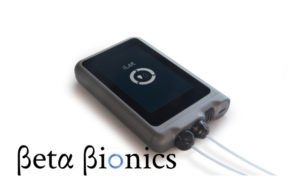Beta Bionics’ iLet bionic pancreas system significantly increased the percentage of time that adults with Type 1 diabetes spent with glucose levels between 70–180 mg/dl when compared to usual care therapy, according to a new study.
iLet bionic pancreas system significantly increased the percentage of time that adults with Type 1 diabetes spent with glucose levels between 70–180 mg/dl when compared to usual care therapy, according to a new study.
The study’s results also suggest that the iLet, using either the Senseonics (NYSE:SENS) Eversense continuous glucose monitoring system (CGM) or Dexcom (NSDQ:DXCM) G5 CGM for input, may provide safe and effective glycemic control for adults with T1D using insulin pumps or MDI therapy, Boston-based Beta Bionics said in a news release. The study’s results were announced at the ADA’s annual meeting in San Francisco.
The iLet device can be configured as an insulin-only bionic pancreas, a glucagon-only bionic pancreas, or a bihormonal bionic pancreas (insulin and glucagon). For the purposes of this study, its insulin-only mode was tested with data from the Dexcom G5 or the Senseonics Eversense CGM.
During the study, the iLet received a glucose signal from the CGM sensor, ran the insulin-dosing algorithm, and integrated an independently actuated pumping mechanism, according to Beta Bionics. The iLet required the user’s weight for initialization, and then autonomously and continuously adapted based upon the range of insulin requirements of the user.
This randomized, cross-over, outpatient study of 34 adults with type 1 diabetes compared the insulin-only mode of the iLet to UC for seven days each. The study included 12 participants who used multiple daily insulin injections (MDI) and 22 patients who used continuous subcutaneous insulin infusion (CSII), for their UC. The cohort had very good glucose control at baseline, with an average screening A1c of 7.5 ± 1.1%, according to Beta Bionics.
The 17 participants enrolled at Massachusetts General Hospital used the Senseonics Eversense while the 17 individuals at Stanford used the Dexcom G5 as the input CGM signal for the iLet. The iLet used the same short-acting insulin that the subjects used in their UC (Humalog or Novolog). All subjects (both pump and MDI users) initiated therapy on the iLet in the same way—by entering their body weight. This was the first study of a fully automated insulin delivery system for people on MDI therapy, with no run-in or training period needed for the device, as well as the first study to test the iLet in a home-use setting.
The results showed that there was no statistically significant difference between the iLet and UC for mean CGM glucose (155±12 vs. 162±26 mg/dl). Percentage of time spent in hypoglycemia (<54 mg/dl) was not different between the iLet and UC (0.7±0.6% vs. 0.7±0.8%), and similar for time spent <70 mg/dl (2.8±1.8% vs. 3.2±2.5%).
However, the iLet significantly increased the percentage of time spent in the range of 70–180 mg/dl compared to UC (70.1% vs. 61.5%). During the overnight period there was a lower mean CGM glucose in the iLet arm compared to UC (148±18 mg/dl vs. 163±36 mg/dl), but no difference in hypoglycemia. There was also no difference in mean CGM glucose in participants using the Dexcom G5 CGM versus the Senseonics Eversense CGM for input to the iLet.
Time spent in hypoglycemia (time < 54 mg/dl) when on the iLet was lower for Dexcom G5 CGM users (0.4 ± 0.5%) than Senseonics Eversense CGM users (0.9 ± 0.6%), however, it is unclear whether this represents an actual difference in hypoglycemia or a difference in the detection of hypoglycemia between the two sensors. The mean insulin total daily dose was not significantly different between the iLet and UC groups (44±20 vs. 42±20 u/day).
“It was encouraging to see that MDI users achieved good glucose control with the iLet in the home setting despite their lack of prior experience with an insulin pump,” said lead study author Dr. Rabab Jafri, assistant director of the pediatric endocrine unit at Massachusetts General Hospital’s diabetes center. “The dosing algorithms in the bionic pancreas automatically adapted to the patient and their changing insulin requirements, no training period was needed for either the pump or MDI subjects, and their weight was the only data point needed to initiate the iLet.
“This study showed that the insulin-only iLet can provide safe and effective glucose control for people with type 1 diabetes, and the results have also led to some improvements in the design of the next generation iLet, which will improve usability and safety,” Jafri said.

